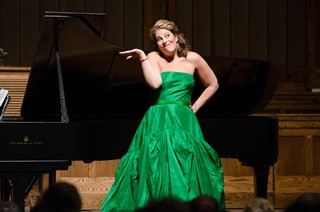|
Back
More Than Only Italian Opera Ottawa
Dominion-Chalmers United Church
07/29/2014 -
Ludwig van Beethoven: Ah! Perfido, Op. 65
Giuseppe Verdi: "In solitaria stanza" from 6 Romanze, No. 3 – "Perduto ho la pace" from 6 Romanze, No. 5 – Stornello: "Tu dici que non m'ami" – "Pace, pace, mio Dio", from La forza del destino
Sergei Rachmaninov: "The Dream" from 6 Romances, Op. 8, No. 5 – "Oh, never sing to me again" from 6 Romances, Op. 4, No. 4 – "How Fair this Spot" from 12 Romances, Op. 4, No. 4 – "Spring Waters" from 12 Romances, Op. 14, No. 11
Francesco Cilea: "Io son l’umile ancella", from Adriana Lecouvreur
Henri Duparc: "Chanson Triste" Op. 2, No. 4 – "Extase" – "Au pays où se fait la guerre"
Jules Massenet: "Pleurez! Pleurez mes yeux!" from Le Cid
Aaron Copland: Simple Gifts from Old American Songs (First Set, No. 4) – "Long Time Ago" (First Set, No. 3) – "At the River" (Second Set, No. 4)
Sondra Radvanovsky (soprano), Anthony Manoli (piano)

S. Radvanovsky (© Michael Gauthier)
Sondra Radvanovsky’s gala recital was definitely a stretch for ChamberFest Ottawa – or any other festival focussing on chamber repertoire. The program’s blend of psychologically calorific and ultra-melodramatic opera arias with rather more low key art and folk songs nonetheless produced an evening of highly concentrated music from a range of times and places.
Radvanovsky is best known as a dramatic soprano in 19th century Italian opera, especially Verdi. Her voice is an extraordinary and superlative instrument with consistently perfect intonation and it filled every cubic inch of Dominion-Chalmers Church. The sound was rich and flawlessly controlled and often featured a subtle, ghostly vibrato which, however, literally cried out for much larger spaces in the world’s major opera houses, many of which to date have hosted this artist.
Opening with Beethoven’s Ah! Perfido, then continuing with two items from Verdi’s Six Romanze, Radvanovsky often presented staggering dynamic levels and range. There was less variety in actual mood, a pattern which continued through a group of Romances by Rachmaninov. Also, there were balance issues with her accompanist Anthony Manoli who, while also her primary coach, sometimes overwhelmed her; notwithstanding their close professional relationship, their performing at times seemed quite separate. In more moderate venues such as Dominion-Chalmers, it might be advisable to have the Steinway open only on the smaller stick, or not at all. Such matters, however, are never easily resolved even for the most experienced artists when working in new locales.
The recital’s first half closed with "Io son l’umile ancella" from Adriana Lecouvreur by Francesco Cilea and, suddenly, it seemed everything preceding had been a warm up. Radvanovsky delivered the aria with exceptional clarity and overwhelming virtuosity. If she’d been trying to reign in her voice for the smaller location earlier, she now had navigated and calculated the acoustics with astute perception.
In the program’s second half, the big question was would Radvanovsky be able to tone down her spinto to make the delicate chansons of Henri Duparc and the unabashedly folksy Old American Songs by Aaron Copland work and, most of the time, she did so indeed. Especially, Duparc’s familiar and exquisite Extase was a small miracle of vocal filigree. The first two Copland songs, Simple Gifts and Long Time Ago, demonstrated similar subtlety though balance issues with Manoli again marred the last of these, At the River.
The operatic show stoppers continued with "Pleurez! Pleurez mes yeux!" from Massenet’s Le Cid; "Pace, pace mio Dio!" from Verdi’s La forza del destino; and, as encore, "O mio babbino caro" from Puccini’s Gianni Schicchi. Then, there was a decidedly racy irony that, in the wake of nearly non-stop passionate melodrama, Radvanovsky’s final encore was "I could have danced all night", the My Fair Lady classic which may indeed have the most Freudian lyrics ever written for music theatre.
Charles Pope Jr.
|